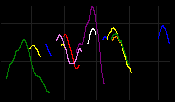Comparison and Advantages
How does Adaptive Modeler compare with other Trading Software?
Most conventional trading software based on technical trading rules supports the user in finding or creating a (mostly static) rule-based trading strategy or algorithm by optimizing or training on historical data. If one searches long enough, this approach will always produce a trading strategy that seems highly profitable on historical data. This however doesn't mean that this strategy will also perform well in the future when market behavior may be different. The apparent past success of the strategy has in fact only been caused by repeated optimizing on the same historical data. This tends to lead to overfitting (or curve fitting) and is likely to produce trading rules that fail when exposed to new price data.
More advanced software may provide adaptive trading rules that automatically adapt to price developments using neural networks, genetic algorithms or other techniques. However, one adaptive trading rule will still not be able to capture the complex behavior of a financial market caused by the interaction of many heterogeneous investors, and this approach still carries the risk of overfitting.
 In financial markets no single trading rule,
algorithm or investment strategy continues to beat the market for any long period of time. Financial markets are constantly changing and new trading strategies come and go, affecting price behavior and each other's returns. As the market evolves, trading strategies need to evolve as well in order to stay profitable.
In financial markets no single trading rule,
algorithm or investment strategy continues to beat the market for any long period of time. Financial markets are constantly changing and new trading strategies come and go, affecting price behavior and each other's returns. As the market evolves, trading strategies need to evolve as well in order to stay profitable.
Instead of optimizing one or a few trading rules by back-testing them over and over again on the same historical data, Adaptive Modeler lets a multitude of thousands of trading strategies compete and evolve on a virtual market in an incremental way and uses the overall behavior of the virtual market to generate forecasts and trading signals. Every historical price is used only once for "testing" the trading rules (as in the real world) and there is no difference in the processing of historical and new price data. So there is no specific reason to expect that a model's back-tested historical performance is better than its future performance (unlike when trading rules have been optimized on historical data). The historical results can therefore be considered more meaningful than results demonstrated by techniques based on optimization.
Although technical trading rules still form the basic building blocks, Adaptive Modeler automates the process of creating new trading rules to adapt to market changes and also diversifies the risk of a single trading rule by using many different trading rules simultaneously to generate trading signals.
Advantages
- models are built incrementally (no optimizing or overfitting on historical data)
- trading signals are based on the activities of all agents (through the virtual market price) and not just on a single trading rule
- models are constantly evolving and adapting to market changes instead of being static
- puts user in charge of high level model evolution control instead of low level rule programming
- returns generally have low correlation with the security returns (low beta)
- equity volatility is generally lower than the security's volatility (smooth equity curves)
